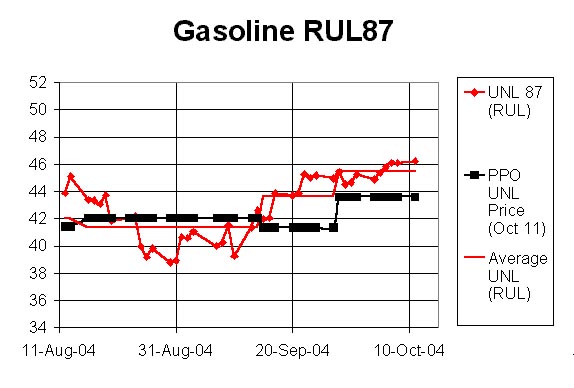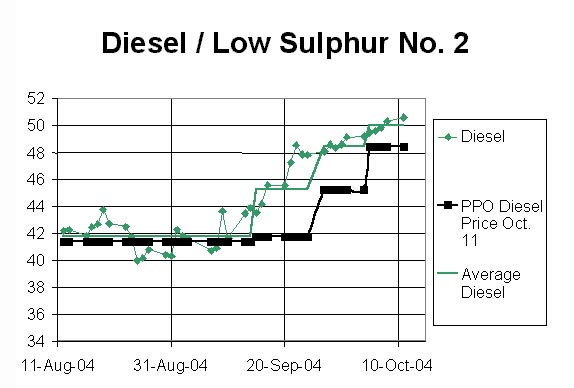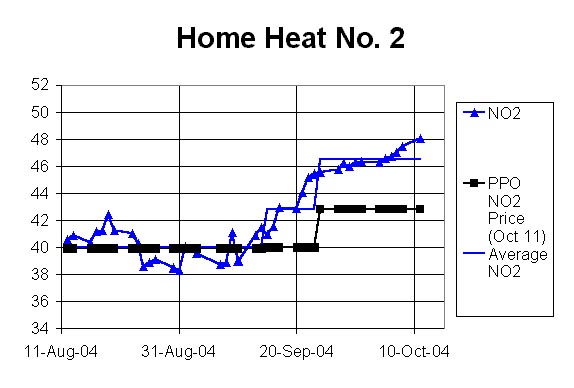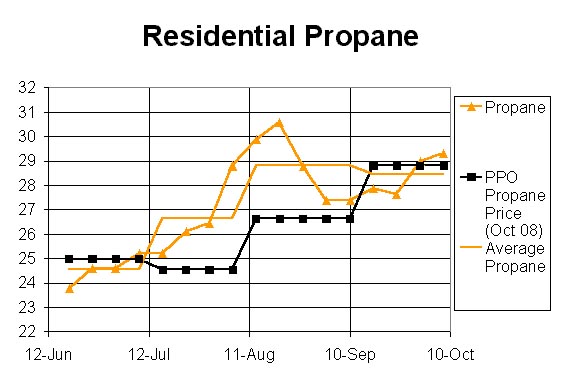|
The following is being
distributed at the request of the Petroleum Pricing Office: The past 30 days have been anything but routine for the Board of Commissioners of Public Utilities Petroleum Pricing Office (PPO) when it comes to dealing with recent high market fuel prices, yet the regulatory system in Newfoundland and Labrador (NL) has effectively met the challenge. Since September 15, the global circumstances that led the PPO to make three price interruptions in Newfoundland and Labrador for various fuels did not improve; in fact, the situation escalated to the point where oil prices surpassed the $54 U.S. barrel mark October 11 on the New York Mercantile Exchange (NYMEX). This spike resulted in increased prices for refined petroleum products (gasoline, home heat, diesel and propane). David Toms, PPO director (acting), said the Newfound and Labrador regulated system has allowed the PPO to better deal with the volatility on the world markets on a local level. "It�s been a difficult period for us when it comes to market versus regulated prices, but we are certain that we have the methods in place to continue to handle the unpredictable market," he said. "The psychological barrier of the $50 barrel has passed, and that has meant more pressure on refined product prices. While the PPO acknowledges prices are currently high, consumers and stakeholders can rest assured that they are set based on fair and objective criteria." Effective 12:01 a.m. Friday, October 15, the PPO will make its regularly scheduled pricing adjustment for all fuels under its authority. The price for all types of gasoline, which was last adjusted October 1, will increase 2.1 cents per litre (cpl). In the case of distillate fuels, diesel (which was last adjusted October 8 for the second time since September 15) will increase by 1.8 cpl, and home heating fuel (last changed September 26) will move upward by 3.7 cpl. Residential propane used for home heating purposes (which hasn�t changed since September 15) will decrease by 0.3 cpl. MARKET FALLOUT Mr. Toms explained that high fuel prices have occurred for several reasons, with the main factors being the high cost of crude and predominating fears about having sufficient supplies to meet the demands of the coming winter heating season. Inventories of distillate home heating fuel are relatively low for this time of the year, noted Mr. Toms; however, propane has been behaving differently from the other fuels regulated by the PPO. U.S. propane inventories have been rebuilding at a solid pace and are reported to be in the upper level of the average range for this time of year. Concerns about available oil supplies remain in the market. For example, in recent days, there have been civil unrest and a general strike in Nigeria (Africa�s largest oil producer) in protest of a 25 per cent hike in fuel prices. A fire at a major pipeline there is believed to have been caused by saboteurs. This is of particular significance because Nigerian crude is prized for its yield of transportation and heating fuels (Reuters, October 12, 2004), and any absence of oil on the market further propels fears about future supplies. Oilfields in the Gulf of Mexico are still running at low levels when compared to activity prior to the recent tropical storms. U.S. imports are also reportedly reduced, which means demand for the winter heating fuels will likely begin long before supplies can return to normal levels. Another reason for the ongoing surge in prices was the fact that the type of oil produced by the Organization of Petroleum Exporting Countries (OPEC) is not ideally meeting the current needs of most refiners for making their products. As well, fuel traders have been watching Norway, the world�s third-largest exporter, as a rig workers� strike has reduced exports. Demand continues to be a major contributor to spiking fuel prices; however, according to Bloomberg News, the IEA has already cut its 2005 forecast for demand growth because oil prices will restrain the economy (October 12, 2004). BACKGROUND PPO benchmark prices are based on the average price of refined petroleum products. Included are graphs that demonstrate where market prices have been in relation to regulated prices up to October 11:
1. Automotive
Fuels - Maximum Retail Pump Prices - Effective October 15, 2004 Media contact: Michelle Hicks, Communications, 1-866-489-8800 or (709) 489-8837 2004 10 15 10:05 a.m. | ||
|








